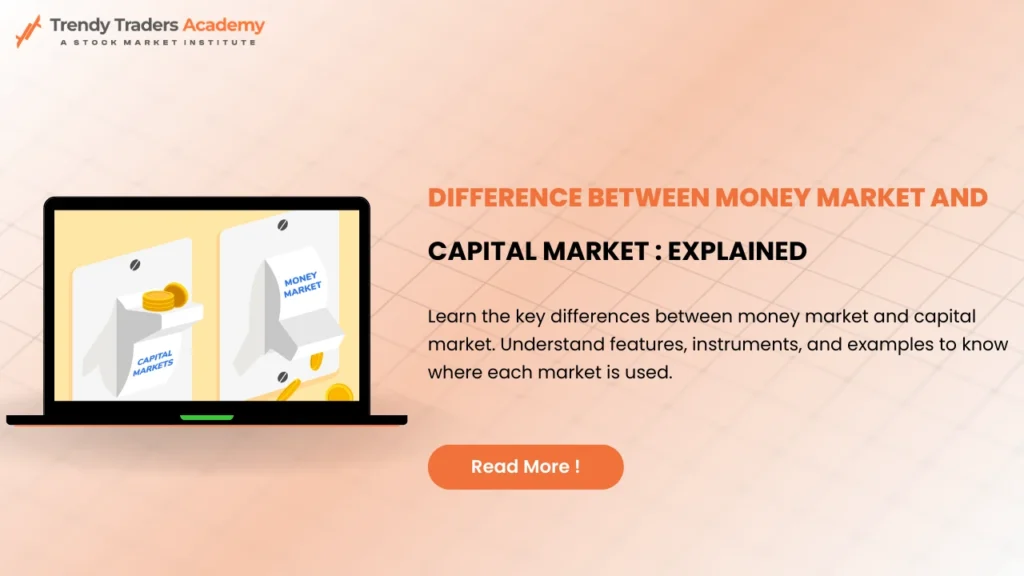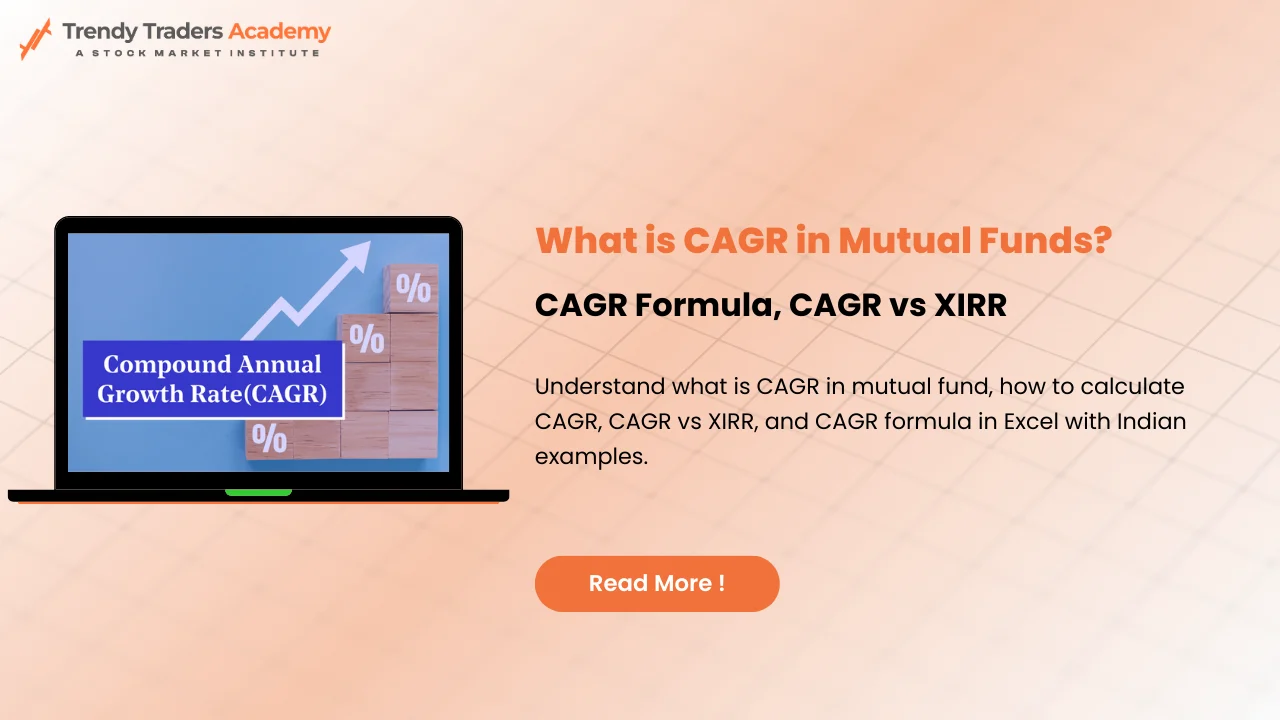
Difference Between Money Market and Capital Market: A Simple, Original, and Detailed Guide
Understanding the difference between money market and capital market is essential to grasp how money moves in the economy and to make smart investment choices. These two markets are key pillars of the financial system but work differently to serve different needs. This blog explains what is money market, what is capital market, and their main distinctions using easy language, examples, tables, and bullet points.
What Is Money Market?
The money market is where short-term lending and borrowing take place. Imagine needing a loan for just a few days or months to cover a sudden expense or cash flow gap — that’s where money markets come in. They provide quick money with low risk.
Characteristics of Money Market
- Short duration: Loans and investments typically last from overnight to under a year.
- High liquidity: Money market instruments can be easily converted into cash.
- Low risk: Because of short maturities and backing by governments or strong companies.
- Low returns: Safer investments offer relatively small gain.
Common Money Market Instruments
Instrument | Description | Typical Maturity |
Treasury Bills (T-Bills) | Short-term government debt | A few days to 1 year |
Commercial Papers | Short-term corporate debt | Up to 270 days |
Certificates of Deposit (CDs) | Fixed deposits from banks | 1 month to 1 year |
Call Money | Overnight borrowing between banks | Usually overnight |
Repurchase Agreements (Repos) | Sale and repurchase of securities | Overnight to few days |
Typical Users of Money Market
- Banks managing daily cash needs
- Companies covering short-term expenses like salaries
- Governments handling monetary policies
What Is Capital Market?
The capital market is geared towards long-term funding and investment. Think of it like planting seeds today for fruits years later — companies and governments raise money for big projects that take time to grow and return profits.
Capital Market Characteristics
- Deals with investments meant for several years, often stretching to decades.
- Regulated by government bodies to keep things fair and protect investors.
Money Market vs Capital Market
Aspect | Money Market Example | Capital Market Example | Takeaway for Investors |
Investment Duration | A bank lends money overnight via call money market | An investor buys stocks expected to grow over 10 years | Money market is for quick access to funds; capital market is for long-term growth |
Risk Level | Government issues Treasury Bills with almost zero risk | Buying shares in a startup carries high uncertainty | Money market instruments are safer; capital market investments involve more risk |
Return | Commercial papers offer steady but low interest | Equity shares may provide dividends and capital gains | Money market yields are moderate; capital market offers higher but variable returns |
Common Capital Market Instruments
Instrument | Description | Typical Duration |
Stocks (Equity shares) | Ownership in a company | Indefinite |
Bonds | Debt issued by companies or governments | 1 year to 30 years |
Debentures | Unsecured bonds | 5 to 10 years |
Mutual Funds | Pooled investments | Varies |
Exchange-Traded Funds (ETFs) | Market-traded index funds | Varies |
Typical Users of Capital Market
- Retail and institutional investors looking for growth
- Companies raising money for expansion
- Governments funding infrastructure projects
Side-by-Side Comparison: Money Market vs Capital Market
Aspect | Money Market | Capital Market |
Investment Duration | Short-term (up to 1 year) | Long-term (over 1 year) |
Typical Risk Level | Low risk | Higher risk |
Returns | Low but safe | Potentially high and variable |
Liquidity | Highly liquid | May be less liquid |
Instruments | T-Bills, commercial papers, CDs, call money | Stocks, bonds, mutual funds, ETFs |
Participants | Banks, governments, financial institutions | Investors, companies, stock exchanges |
Purpose | Managing cash on a daily basis and short-term needs | Fund long-term expansion and projects |
Market Structure | Mostly OTC and less formal | Formal exchanges and OTC |
Regulation | Central banks (such as RBI) | Securities regulator (e.g., SEBI) |
Real-Life Example to Understand the Difference
- Money Market Example: A company has to pay employee salaries in 15 days but doesn’t have enough funds now. It borrows ₹5 crores via commercial paper to cover this short-term gap. This is a typical money market transaction.
- Capital Market Example: The same company wants to open a new factory costing ₹500 crores. It issues equity shares and bonds to raise this money, expecting the factory to produce profits for years. This is a capital market activity.
Why These Markets Matter to You
- If one requires short-term safety and consistent cash returns, money market instruments like T-Bills or CDs suit one the best.
- If one seeks growth of capital over a period of certain years and have good risk appetite, capital market options like stocks or bonds fit one’s needs.
- Combining both markets helps balance your portfolio — providing safety in the short term and good growth in the long term horizon.
Aspect | Money Market Example | Capital Market Example | What It Means for You |
Investment Duration | A company borrows ₹5 crore by issuing commercial paper for 3 months to pay salaries. | A company raises ₹100 crore by issuing shares to fund a new factory with expected returns in 5 years. | Money market suits short-term needs; capital market is for long-term growth. |
Risk Level | Government treasury bill with a 91-day maturity, virtually risk-free. | Investing in stock of a tech startup promising high returns but volatile prices. | Money market has minimal risk; capital market carries investment risks. |
Liquidity | Certificates of Deposit redeemed on maturity within months. | Stocks may take time to sell depending on market demand. | Money market is highly liquid; capital market liquidity fluctuates. |
Returns | Returns on commercial papers are fixed and low, ensuring stable income. | Stocks, dividends and price appreciation can give high returns but are uncertain and volatile. | Choose based on one’s risk appetite and how long they are willing to hold it.. |
Regulatory Oversight | Regulated by central banks, providing safer and quicker transactions. | Securities market regulators monitor capital market operations and protect investors. | Both provide regulated environments but with different focuses. |
Summary: Wrapping It Up
The difference between the money market and the capital market is all about the time frame of the investment and the risk appetite of an individual:
- A Money Market is usually chosen keeping a Short-term time horizon in mind , but offers lower risk, lower returns and higher liquidity.
- Capital Market is usually selected keeping a Long-term time horizon in mind, higher risk, potentially higher returns, but moderate liquidity.
Getting a good grasp on these markets helps one select the right investment instrument based on an individual’s goals and risk appetite.
Additional Tips for Investors
- One should begin learning with money market instruments if they are risk-averse or require liquidity.
- Using capital markets to multiply wealth over years or decades.
FAQ'S
What is the major difference between money market and capital market?
Money market is for short financial needs with lesser risk; capital market funds growth on a longer time frame horizon with higher risk and returns.
Are stock shares part of the money market?
No. Stocks are capital market instruments.
Who regulates the money and capital markets?
Central banks like RBI take care of money markets; securities regulators like SEBI oversee capital markets.
Can I lose capital in the money market?
It’s very unlikely since money market deals with low-risk, short-duration instruments.
Can I earn high returns from the money market?
Generally, no. The returns are low but stable.










